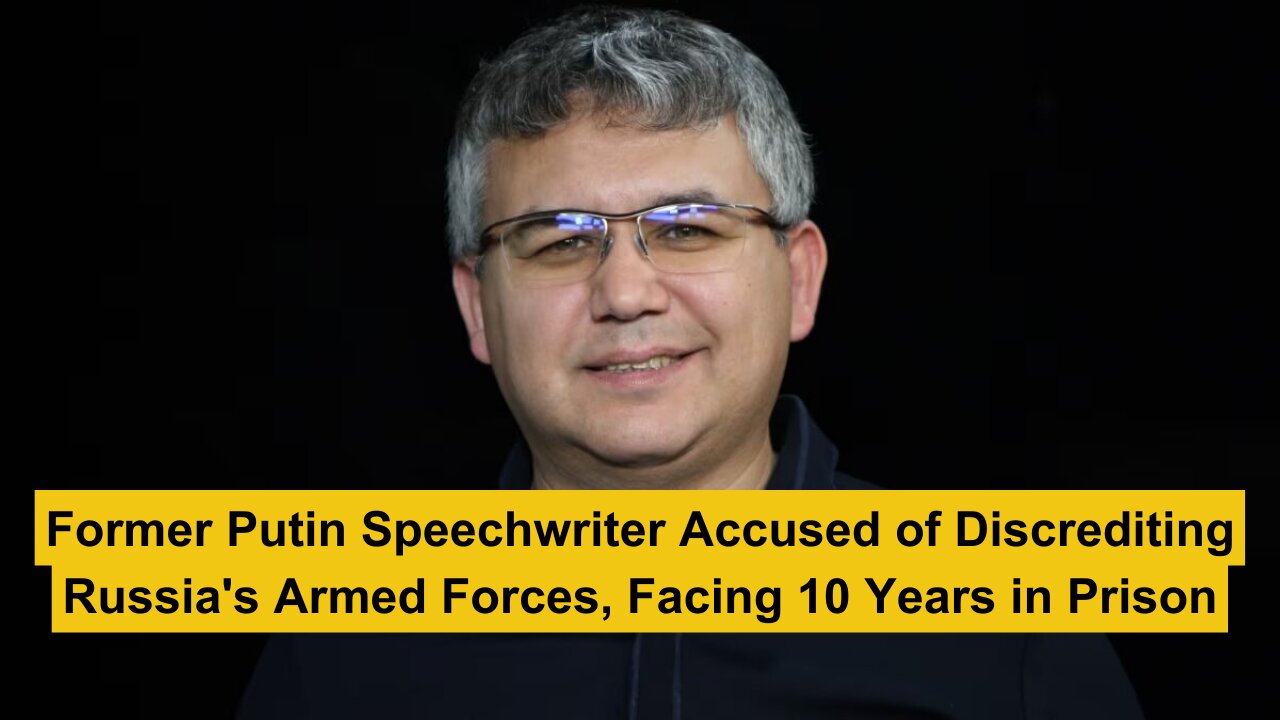Premium Only Content

Former Putin Speechwriter Accused of Discrediting Russia's Armed Forces, Facing 10 Years in Prison
Abbas Gallyamov, a former speechwriter for Russian President Vladimir Putin, is facing up to 10 years in prison after being accused of discrediting Russia's armed forces. Gallyamov's name appeared in the Russian Interior Ministry's online registry of wanted persons last week, and he is suspected of making statements that criticize Moscow's war in Ukraine.
According to Setevyye Svobody, a group that monitors the rights of online journalists, Gallyamov gave an interview with Ukraine's 1+1 television's YouTube project in April 2022, discussing alleged war crimes committed by Russian troops in the Ukrainian cities of Bucha and Kramatorsk. The investigation against Gallyamov was launched on January 18, and his name was added to the wanted list on February 17, more than one month before it appeared on the ministry's website.
If convicted, Gallyamov faces a lengthy prison sentence, and he has been added to the Russian Justice Ministry's registry of foreign agents. The ministry accused him of distributing "materials compiled by foreign agents, expressed ideas against the special military operation in Ukraine, participated as an expert, and respondent on information platforms presented by foreign entities."
Gallyamov, who currently resides in Israel, worked as a speechwriter for Putin from 2008 to 2010 and was a deputy chief of the administration of then-President of Russia's Republic of Bashkortostan Rustem Khamitov from 2010 to 2014.
In a recent interview with RFE/RL, Gallyamov suggested that the ongoing unprovoked invasion of Ukraine may lead to a revolution in Russia. He also reflected on his time as a member of Putin's speechwriting team, saying that at that time, nobody could have predicted "that Russia would turn into some kind of fascist state, as it is now."
The case against Gallyamov has sparked widespread condemnation from human rights groups and free speech advocates, who say that the charges are politically motivated and are designed to silence any criticism of the Russian government's actions in Ukraine. The case is just the latest example of the Kremlin's crackdown on dissent, which has intensified since the start of the war in Ukraine in 2014. Returning to the case of Abbas Gallyamov, it is important to note that his situation is just one example of the broader pattern of government repression and censorship in Russia. Over the years, the Russian government has implemented numerous measures to stifle dissent, including cracking down on independent media outlets, arresting opposition leaders, and passing laws that limit freedom of expression.
Subscribe for more content like this.
The charges against Gallyamov, which accuse him of discrediting Russia's armed forces, are part of a larger effort by the Kremlin to control the narrative around its actions in Ukraine. By punishing those who speak out against Russia's war in Ukraine, the government hopes to maintain the image of a victorious and heroic military, even as evidence of war crimes and other atrocities continues to emerge.
Despite these efforts, however, there are still many brave individuals who are willing to speak out against the Russian government's abuses. Journalists, human rights activists, and ordinary citizens continue to risk their safety and well-being to document and expose the truth about what is happening in their country.
It is important to support these individuals and to advocate for their rights to freedom of expression and dissent. This means raising awareness of their stories, sharing their messages with a wider audience, and pushing for policy changes that will help to protect them from government persecution.
At the same time, it is also important to recognize the limitations of such efforts. Despite the best intentions and the most valiant efforts, the Russian government is unlikely to change its ways anytime soon. The current regime is deeply committed to maintaining its power and control, and it will stop at nothing to achieve its goals.
-
 LIVE
LIVE
Lofi Girl
2 years agoSynthwave Radio 🌌 - beats to chill/game to
277 watching -
 2:19:32
2:19:32
Badlands Media
1 day agoDEFCON ZERQ EP. 005
111K41 -
 2:35:23
2:35:23
FreshandFit
5 hours agoWhy Black Men Don't Date Black Women Debate
22.1K17 -
 2:03:42
2:03:42
Inverted World Live
9 hours agoBigfoot Corpse Coming to the NY State Fair | Ep. 94
94.8K21 -
 6:16:23
6:16:23
SpartakusLIVE
10 hours ago$1,000 Pistol Challenge || #1 ENTERTAINER of The EONS Eradicates BOREDOM
71.3K2 -
 2:33:37
2:33:37
TimcastIRL
7 hours agoTrump Orders Review of Smithsonian For Being Woke & Out of Control | Timcast IRL
170K54 -
 3:09:10
3:09:10
Barry Cunningham
10 hours agoPRESIDENT TRUMP HAS TAKEN THE MONSTER AWAY FROM THE LEFT! HORROR STORIES WON'T WORK ANYMORE!
74.6K77 -
 1:29:55
1:29:55
WickedVirtue
5 hours agoLate Night Fortnite w/ Friends
43.3K -
 3:34:06
3:34:06
This is the Ray Gaming
5 hours ago $0.55 earnedCould you be? Would you be? Won't you be my RAYBOR? | Rumble Premium Creator
25.7K -
 1:46:52
1:46:52
JahBlessGames
6 hours ago🎉Come een' and come tru' - VIBES | MUSIC | GAMES
46K2